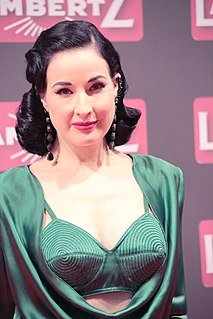A Quote by Theodore Sturgeon
An ethic isn't a fact you can look up. It's a way of thinking.
Related Quotes
The fact is I look at what's happening to this country, I look at the way China is just ripping us off, I look at OPEC the way they are ripping us off with the oil prices. I mean, people are gonna be paying six and seven dollars a gallon for gasoline very, very soon; and you're gonna be up to $150 a barrel; and they wouldn't even be there if it weren't for us.
It was never a marketing tool. People say that, but I dress this way for the same reasons I did when I first started doing it. It still comes from a serious place inside of me. I get up in the morning, and I think I just look better a certain way I do my makeup. I want to shine, I want to glitter. I'm not getting up thinking, "Oh, this'll get 'em." And I'm not doing it to make a statement. I'm just doing it to look like Dolly - the Dolly that I know and the Dolly that you know.
As one might expect in a society with mass communications and mass markets, the pseudo-ethic says that whatever is popular, is right. Where the traditional ethic derives its sanction from the superiority of a few, the pseudo-ethic derives its sanction from the inferiority of a great many. The pseudo-ethic is keyed, not to the spiritually gifted, but to the spiritually ungifted.
Puns are little "plays on words" that a certain breed of person loves to spring on you and then look at you in a certain self-satisfied way to indicate that he thinks that you must think that he is by far the cleverest person on Earth now that Benjamin Franklin is dead, when in fact what you are thinking is that if this person ever ends up in a lifeboat, the other passengers will hurl him overboard by the end of the first day even if they have plenty of food and water.
Look, boys, it ever strike you that the world not real at all? It ever strike you that we have the only mind in the world and you just thinking up everything else? Like me here, having the only mind in the world, and thinking up you people here, thinking up the war and all the houses and the ships and them in the harbour. That ever cross your mind?
Quotes are like prompts. A way of searching, connecting the dots. Other people's thinking has always - both positively and negatively - jumpstarted my thinking. Quotes are also a way of acting out not just a text, and not just thinking, but the making of a text. The construction of thinking. The quotes are part of those constructions and reflections. Thinking through quotes, which to say scouring a range of texts for insight, is one way to outline the process of thinking/feeling through a subject.
I'm always astounded at the way we automatically look at what divides and separates us. We never look at what people have in common. If you see it, black and white people, both sides look to see the differences, they don't look at what they have together. Men and women, and old and young, and so on. And this is a disease of the mind, the way I see it. Because in actual fact, men and women have much more in common than they are separated.
Another way to look at meditation is to view thinking itself as a waterfall, a cascading of thought. In cultivating mindfulness, we are going beyond or behind our thinking, much the way you might find a vantage point in a cave or depression in the rock behind a waterfall. We still see and hear the water, but we are out of the torrent.






































